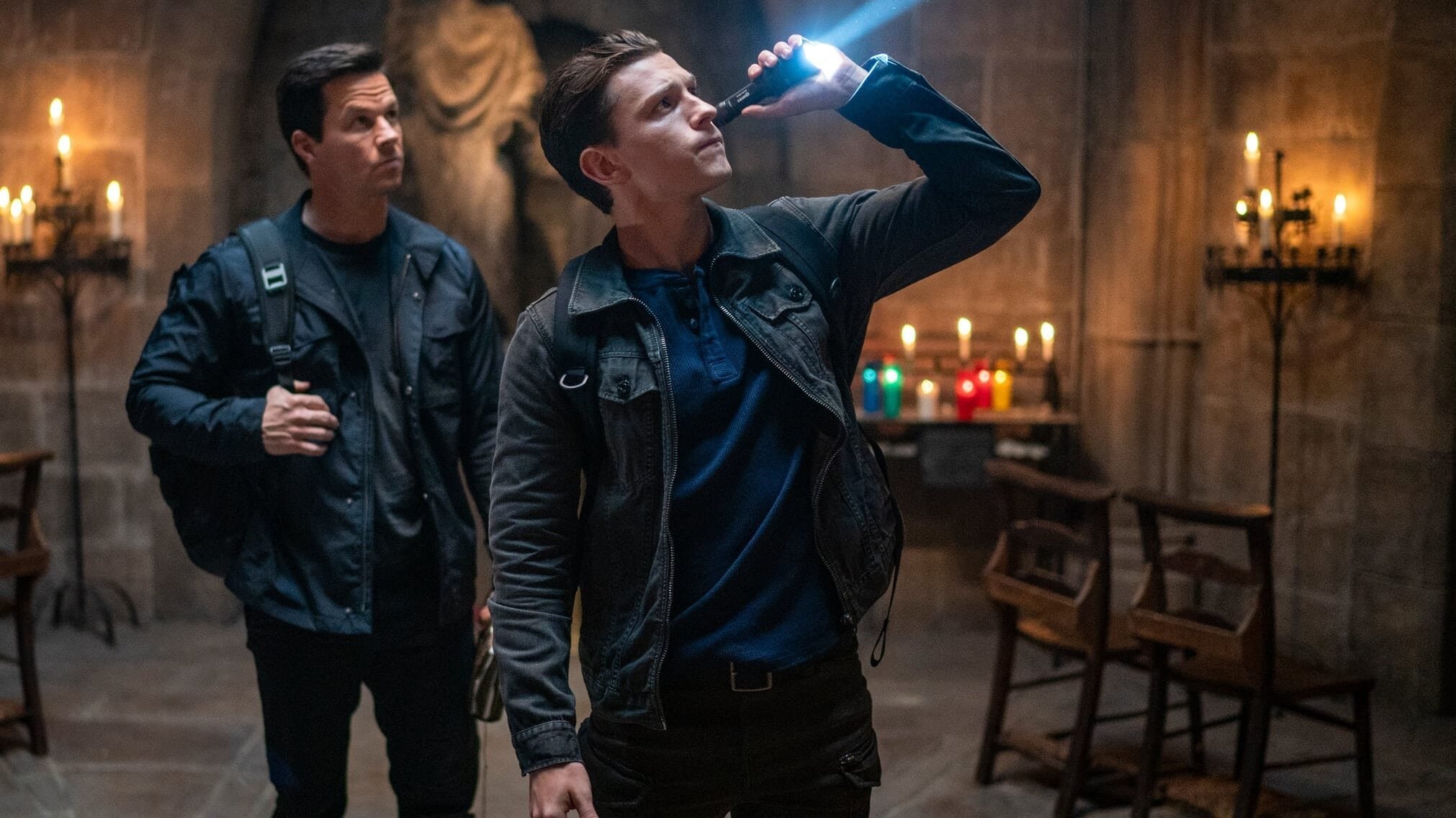REVIEW: ‘Uncharted’ finds only ordinary ideas
Tom Holland and Mark Wahlberg star in Uncharted, directed by Ruben Fleischer.
Every so often, there’s a small detail in a movie that seems more worthy of the audience’s attention than the story we’re actually following. It was one of Roger Ebert’s favourite tools to tell if a film was worth his time. In the case of Uncharted, the thing that’s really worth the viewer’s time isn’t the movie at all, but the circuitous journey it took to getting made.
The video game adaptation has had six previous directors attached at various points in the movie’s 14-year development, and seemingly endless rewrites. The eventual star, Tom Holland, was cast in 2017 but the project still didn’t start production until 2020. When you consider that the source material is considered one of the most cinematic-dependent game series out there, I’d be a lot more interested in a documentary about the process than the final film itself. How could it be so hard to translate a wise-cracking, rough-and-tumble hero who digs up antiquities from game consoles to the big screen?
The answer isn’t necessarily that it’s a video game movie, as beleaguered as that genre is. Movies like Pokémon Detective Pikachu, Free Guy, and even the first Sonic the Hedgehog can deliver relatively solid entertainment without being embarrassed by their roots or feeling like they lack substance. The core problem with Uncharted is how it bears the scars of its long development. Without a consistent writer or director with a tangible style (a James Gunn or a Taika Waititi, perhaps), watching the movie is an exercise in identifying all the familiar screenwriting parts as they’re pulled from the shelf. Meanwhile, we wait patiently (or not) for Holland’s character to acquire the lived-in quality that propelled the games’ strong reputation.
Sophia Ali as Drake’s ally/rival, Chloe Frazer.
This is, in fact, an origin film, explaining the 10-15 year gap between the adventurer Nathan Drake’s age in the games and Holland’s fresh-faced look. By trying to kick off a new franchise, Sony’s decision to cast Holland as the lead means he’s missing much of the life experience that helped audiences bond to a character like Indiana Jones (a major inspiration for the games). Despite his upbringing at an orphanage and a talent with pick-pocketing, Holland’s Drake lacks much of an edge or a personality. He’s just a history nerd/physically ripped bartender who loves his estranged big brother, which is all the screenwriters need to insert Victor “Sully” Sullivan (Mark Wahlberg) into the story.
Sully has had the adventures and mishaps that most game fans would expect from the lead character, and yet we don’t see any of them. Sully has his eye on the lost ships of the 16th-century Magellan expedition, said to be worth $5 billion. He needs Drake’s experience studying the expedition’s history to uncover the ships’ location, while trying to get there before the movie’s villains: Santiago Moncada (Antonio Banderas) and his goons. Moncada is descended from the Spanish aristocrats who were cheated out of their investment by Magellan and his crew, and so Moncada is bent on getting his centuries-old return.
This is where the filmmakers try to insert sequences to remind viewers of the games: puzzle-based transits of Barcelona and the Philippines, which seem needlessly complicated yet bizarrely simple at the same time. In one instance, Drake allows the villains to be misled by a fake X on a map, only to lead them right to the correct spot by carelessly sailing his speedboat past their location. Drake is clever at one moment and naive the next - the screenplay takes more liberties with this than it does with the physics in the climactic action scene.
We hit every beat you’d expect. The hero refuses the call to adventure, but is convinced in the next scene. The hero carries talismans that will be important to the plot (and sequels). An ally is introduced who betrays the heroes at a critical juncture. Some hidden backstory causes a brief rift in the central partnership. A fantastic treasure is found, but in keeping with Dr. Jones’ adage, “It belongs in a museum!” the heroes must settle with a smaller payout.
Antonio Banderas as Santiago Moncada.
As bland as the central duo of Drake and Sully are, they’re not helped by the supporting characters. The heroes’ sometime ally, sometime rival Chloe Frazer (Sophia Ali) is written out of the climax entirely (one of those rewrite scars, I believe). And in an attempt at a twist, the villains go through a power struggle that only serves to strip away thematic weight from the conclusion (though congrats to Tati Gabrielle for her increased screen time).
Crucially, nothing in Uncharted is as bad as many game adaptations of the past 10 years. It’s just thoroughly boring. Maybe if the film finds its feet in this relatively quiet time at the box office (before The Batman opens in a couple of weeks) it will inspire Sony to make a sequel and give it to a filmmaking team with a well-defined voice. Otherwise, we can close the journal on the messy treasure hunt of the Uncharted movie saga. Maybe there was a cinematic successor to Indy in there, or maybe it’s buried on a different island.
Uncharted gets two stars out of four.
Stray thoughts
I had to know what the maximum lifting capacity of any heavy-duty helicopter can be; turns out it’s comically less than a ship from the Age of Sail.
The “symbology” bits from The Da Vinci Code are likely better than the puzzle-solving here.
I get that Drake is supposed to be one of those flashy juggling bartenders, but I don’t know why he pours ingredients into a shaking tin before pouring them into a mixing glass.




